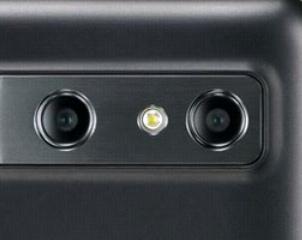Smartphone devices with 3D(without glasses) feature increasingly in demand, so many vendors that make these devices to meet market needs of users who like the 3D content. One of them is LG, which has released the LG Optimus 3D P920. This device is not the latest 3D smartphone from LG like the Optimus 3D Max and Optimus 3D Cube which was recently launched, but this device has been launched in the last year.
Design : The LG Optimus 3D P920 has dimension of 128 x 68.8 x 11.9 mm and weight of about 167 gram. The body made of plastic material and the rear casing use doff material, complete with Stereoscopic 3D text that is one of the excellent feature of this smartphone.
At the top there are a 3.5mm audio jack and power button/lock, on the left there are an HDMI port and a micro USB, and the right side there is volume buttons and a 3D button. Moreover, the front is dominated by the LCD screen with touch sensitive keys below.
Screen and UI : The LG Optimus 3D P920 come with 4.3 inches 3D LCD capacitive touchscreen with resolution of 480 x 800 pixels. This device is capable of displaying 3D images, with stereoscopic technology, which utilizes two of your eyes so the brain accept it as a 3D graphics.
Stereoscopic effective for one person in front of the screen with a certain angle and distance. So, to enjoy 3D on-screen the Optimus 3D does not need special glasses.
Interface of this smartphone similar to the LG Optimus Black, difference no UI Gesture here. Homescreen that can use up to 7 screen, you can add widgets, shortcuts, and folders.
3D applications : In the Optimus 3D already there are 10 items 3D applications, such as: 3D camera, 3D gallery, 3D games, 3D Games & Apps, 3D Guide, 3D space, Asphalt 6, Gulliver's Travel, Lets Golf 2 and NOVA.
When enjoying a variety of 3D content on the smartphone, the screen resolution and color quality will decline, but if you look at 3D content in a range that is not so close, the resolution reduction will still look good.
There are 3 game from Gameloft who already support 3D display and each game will bring up a 3D depth setting interface or 3D depth in the upper left. If the eye has felt tired due to the 3D display, immediately use the settings. Meanwhile, for the camera, you can change it from 2D into 3D camera or vice versa, by pressing buttons provided on the side of the smartphone.
Performance : The LG Optimus 3D P920 powered by Dual-core 1GHz ARM Cortex-A9 proccessor, PowerVR SGX540 GPU with TI OMAP4430 chipset, and run on Android 2.2 Froyo(upgradable to v2.3). For storage media available internal memory with capacity of 8GB which still can be expanded via microSD with capacities up to 32GB.
These devices use the Tri-Dual technology (dual core, dual channel, dual memory). Additional channel and memory will impact on the working efficiency of the dual processor and battery life. Another advantage is the memory bandwidth of the dual tri simultaneous 3x chipset, bigger than the other dual-core smartphone that only has a single channel and single memory.
Camera : The LG Optimus 3D P920 equipped with 2D/3D 5 megapixel autofocus, LED flash with the ability to record video HD 1080p @30fps (2D), 720p @30fps (3D). There are two lenses on the back to catch the object into the form of stereoscopic 3D.
Connectivity : The Optimus 3D work on GSM(850/900/1800/1900), 3G(HSDPA/HSUPA 900/1700/1900/2100) network, at speeds up to 14.4Mbps, and also offer connectivity such as WiFi 802.11 b/g/n, DLNA, WiFi tethering, a-GPS and Bluetooth 3.0.








